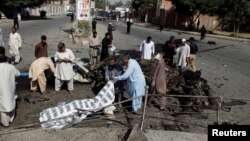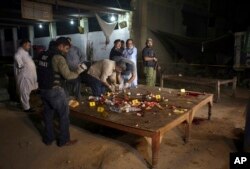A Pakistani army spokesman said Saturday that the military had beefed up the monitoring of Pakistan's border with Afghanistan after insurgents carried out attacks Friday on three major Pakistani cities — Quetta, Parachinar and Karachi.
Major General Asif Ghafoor said the attacks had been traced to rebel sanctuaries in Afghanistan.
In addition, the Pakistani army said it conducted counterterrorism raids overnight in Peshawar, killing three terrorists and arresting 12 suspects.
Officials in Pakistan said Saturday that the death toll from the attacks in the three Pakistani cities had risen to more than 80.
Nearly 100 people were injured in the attacks, which began in the southwestern city of Quetta, where the death toll was at 14, with 20 wounded. Senior police officers apparently were the target, with at least seven officers among the dead.
Both the Islamic State group and Jamaat-ul-Ahrar (JuA), an offshoot of the Pakistani Taliban, claimed responsibility for the attack on Quetta.
Hours later, two bombs went off back to back in the northwestern town of Parachinar, targeting a crowded market in the semiautonomous Kurram tribal district near the Afghan border. The death toll in Parachinar was at least 67, Dr. Sabir Hussain, an official at a hospital in Parachinar, told The Associated Press.
Sajid Turi, a member of parliament from the area, told local journalists that a low-intensity blast occurred during afternoon rush hours, before a second powerful bomb exploded.
The lawmaker said he anticipated the death toll would increase. Hospital sources said more than 260 wounded people had been brought in from the scene, and more than 60 were listed in critical condition.
The population in the area where the deadly blasts occurred is predominantly Shi'ite Muslims.
There were no immediate claims of responsibility for the Parachinar blasts.
Later Friday evening, gunmen in the port city of Karachi attacked police officers at a roadside restaurant, killing five.






